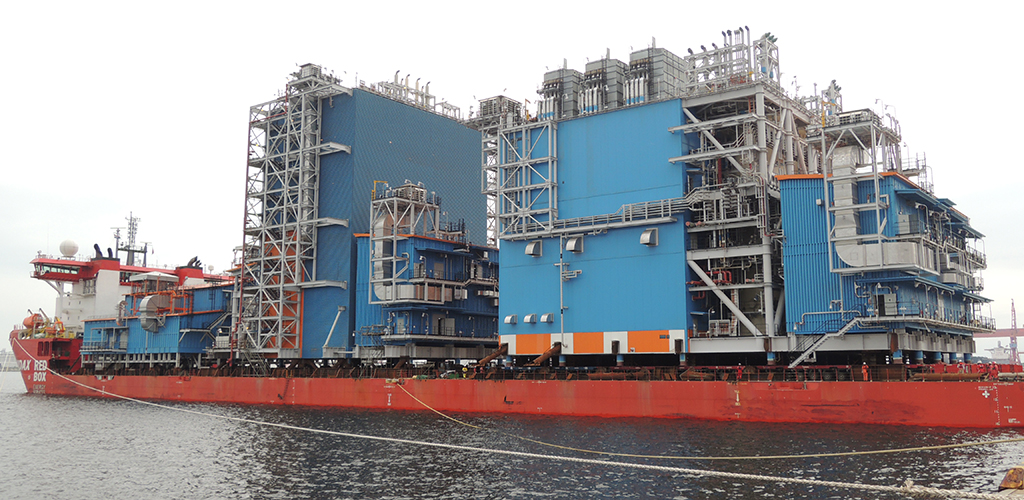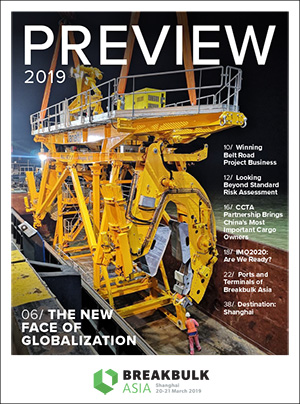Mar 07 | 2019
A conversation with Robin Zhang, AIG, and Breakbulk

 AIG is known for going beyond standard risk assessment in a process known as marine loss control engineering (MLCE). Will you explain how this is different from the standard assessment and what are the benefits to cargo owners?
AIG is known for going beyond standard risk assessment in a process known as marine loss control engineering (MLCE). Will you explain how this is different from the standard assessment and what are the benefits to cargo owners? MLCE’s beyond standard risk control service means partnering with our insured and their related parties. As MLCE, we regard ourselves as the client’s partner on risk management and we get to know our clients as well as possible. Our goal is to align ourselves with our clients—not only on their figures, but also on their “spirit” and brand value.
In this business, experience and professionalism counts. Our clients are supported in their operations with highly operational and technical skilled engineers, including former mariner masters, marine surveyors or former logistics managers.
Unlike many insurers, MLCE is not restricted to a single country. MLCE has 17 in-house dedicated Regional Marine Loss Control Engineers, strategically located worldwide and further supported by specifically chosen network partners.
Of course, there are financial benefits to cargo owners. With controlled losses our clients benefit from non-claimable indirect costs, such as reduced management work in handling the claims, reproduction of lost goods, risen insurance premium due to claims, etc. But there are also non-financial benefits. With improved risk management programs and lower loss ratio, our clients benefit from higher business opportunity, higher productivity and efficiency, and can gain a higher reputation in the market.
An important part of MLCE is anticipating risk or identifying what can go wrong. In your experience, what are the most common risks shippers overlook?
I see the following four things most frequently:
1. Inadequate procedure and lack of method statement.
2. Lack of marine input.
3. Poor control at destination port and to site.
4. Commercial bias for each company, and lack of communication between the involved parties.
Can you provide an example of a shipment that didn’t have adequate coverage and what were the results?
We have a professional insurance market intermediary as well as our own experienced distribution channel. Our insurance product has been well developed for long time and provides a comprehensive risk solution to clients, so that it tends to avoid any gap from coverage as long as it falls within the scope of insurance.
When insurance coverage is purchased inadequately, one of the possible scenarios would be omission from reading the contractor agreement where a section specifies the needs for insurance arrangement. The contractor is usually liable as the applicant of insurance, and should make sure the insurance requirements are well communicated and understood.
What types of cargoes pose the biggest risks?
Every type of cargo could become a big risk. Each product has different specific transportation risk exposures under different ways of conveyance, different weather and season, or in different geographical locations. All cargoes can be safely delivered to the other side only with good care custody and control standards.
When you look at today’s risk landscape as it relates to project cargo, do you see risks increasing or decreasing in the years ahead and why?
Regrettably the answer is increasing. With increasing pressure on cost saving and shorter delivery time, the shippers or the involved parties tend to reduce cost on packing standards and other logistics standards or requirements. Besides that, we also can see there are increasing global risks on sea piracy, overland cargo hijacking and pilferage, adverse weather, etc.
RELATED SESSION
Wednesday, 20 March | 13:00 – 14:00 | Conference
Theatre Risk Management and Loss Prevention Coverage: When Do You Need It?
Reducing risk in business dealings is a hot topic as contracts are becoming increasingly “lump sum” and risk is pushed downward from cargo owners. What does this mean for service providers and contractors? Two industry experts will provide perspectives and discussion.
I. Contract Risks in Carriage of Deck Cargo
Mr. Gang Qiao, Director, New World P&I Service Co.
II. Reducing Risk in Breakbulk Cargo Ventures
Mr. Robin Zhang, Marine Loss Control Manager-China, AIG Insurance Company China
American International Group, Inc. (AIG) is a leading global insurance organization. Building on 100 years of experience, today AIG member companies provide a wide range of property casualty insurance, life insurance, retirement products, and other financial services to customers in more than 80 countries and jurisdictions. These diverse offerings include products and services that help businesses and individuals protect their assets, manage risks and provide for retirement security.
AIG common stock is listed on the New York Stock Exchange. AIG Insurance Company China Limited (AIG China), a member company of AIG, is a registered property insurer in China, with branch offices in Beijing, Shanghai, Guangdong Province, Shenzhen, Jiangsu Province, Zhejiang Province, and marine insurance operation center in Shanghai.


